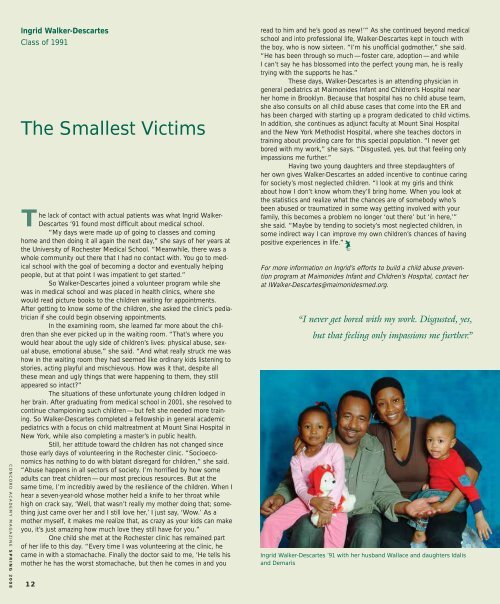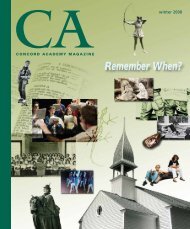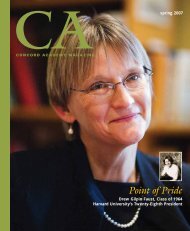WWW.CONCORDACADEMY.ORG
The Pull of Politics - Concord Academy
The Pull of Politics - Concord Academy
- No tags were found...
You also want an ePaper? Increase the reach of your titles
YUMPU automatically turns print PDFs into web optimized ePapers that Google loves.
CONCORD ACADEMY MAGAZINE SPRING 2008Ingrid Walker-DescartesClass of 1991The Smallest VictimsThe lack of contact with actual patients was what Ingrid Walker-Descartes ’91 found most difficult about medical school.“My days were made up of going to classes and cominghome and then doing it all again the next day,” she says of her years atthe University of Rochester Medical School. “Meanwhile, there was awhole community out there that I had no contact with. You go to medicalschool with the goal of becoming a doctor and eventually helpingpeople, but at that point I was impatient to get started.”So Walker-Descartes joined a volunteer program while shewas in medical school and was placed in health clinics, where shewould read picture books to the children waiting for appointments.After getting to know some of the children, she asked the clinic’s pediatricianif she could begin observing appointments.In the examining room, she learned far more about the childrenthan she ever picked up in the waiting room. “That’s where youwould hear about the ugly side of children’s lives: physical abuse, sexualabuse, emotional abuse,” she said. “And what really struck me washow in the waiting room they had seemed like ordinary kids listening tostories, acting playful and mischievous. How was it that, despite allthese mean and ugly things that were happening to them, they stillappeared so intact?”The situations of these unfortunate young children lodged inher brain. After graduating from medical school in 2001, she resolved tocontinue championing such children — but felt she needed more training.So Walker-Descartes completed a fellowship in general academicpediatrics with a focus on child maltreatment at Mount Sinai Hospital inNew York, while also completing a master’s in public health.Still, her attitude toward the children has not changed sincethose early days of volunteering in the Rochester clinic. “Socioeco-nomics has nothing to do with blatant disregard for children,” she said.“Abuse happens in all sectors of society. I’m horrified by how someadults can treat children — our most precious resources. But at thesame time, I’m incredibly awed by the resilience of the children. When Ihear a seven-year-old whose mother held a knife to her throat whilehigh on crack say, ‘Well, that wasn’t really my mother doing that; somethingjust came over her and I still love her,’ I just say, ‘Wow.’ As amother myself, it makes me realize that, as crazy as your kids can makeyou, it’s just amazing how much love they still have for you.”One child she met at the Rochester clinic has remained partof her life to this day. “Every time I was volunteering at the clinic, hecame in with a stomachache. Finally the doctor said to me, ‘He tells hismother he has the worst stomachache, but then he comes in and you12read to him and he’s good as new!’” As she continued beyond medicalschool and into professional life, Walker-Descartes kept in touch withthe boy, who is now sixteen. “I’m his unofficial godmother,” she said.“He has been through so much — foster care, adoption — and whileI can’t say he has blossomed into the perfect young man, he is reallytrying with the supports he has.”These days, Walker-Descartes is an attending physician ingeneral pediatrics at Maimonides Infant and Children’s Hospital nearher home in Brooklyn. Because that hospital has no child abuse team,she also consults on all child abuse cases that come into the ER andhas been charged with starting up a program dedicated to child victims.In addition, she continues as adjunct faculty at Mount Sinai Hospitaland the New York Methodist Hospital, where she teaches doctors intraining about providing care for this special population. “I never getbored with my work,” she says. “Disgusted, yes, but that feeling onlyimpassions me further.”Having two young daughters and three stepdaughters ofher own gives Walker-Descartes an added incentive to continue caringfor society’s most neglected children. “I look at my girls and thinkabout how I don’t know whom they’ll bring home. When you look atthe statistics and realize what the chances are of somebody who’sbeen abused or traumatized in some way getting involved with yourfamily, this becomes a problem no longer ‘out there’ but ‘in here,’”she said. “Maybe by tending to society’s most neglected children, insome indirect way I can improve my own children’s chances of havingpositive experiences in life.”For more information on Ingrid’s efforts to build a child abuse preventionprogram at Maimonides Infant and Children’s Hospital, contact herat IWalker-Descartes@maimonidesmed.org.“I never get bored with my work. Disgusted, yes,but that feeling only impassions me further.”Ingrid Walker-Descartes ’91 with her husband Wallace and daughters Idalisand Demaris











